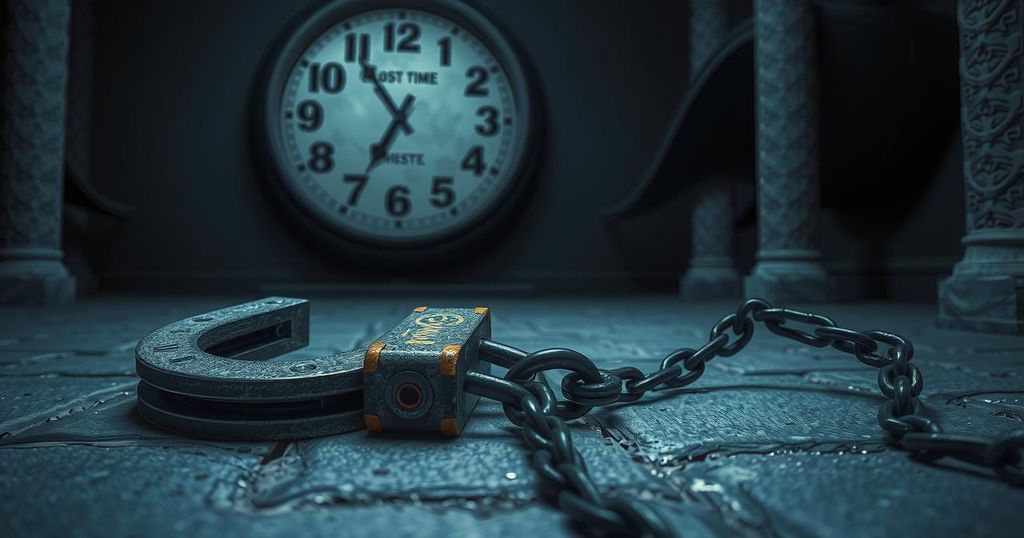The Prolonged Incarceration of Jagtar Singh Johal: A Call for Justice
Scottish activist Jagtar Singh Johal has spent over seven years in an Indian jail without conviction, accused of terrorism. He was recently acquitted in one case, although he faces multiple other charges. His family alleges torture, while his legal team claims the prosecution’s evidence is unreliable. The UK government is urged to secure his release, highlighting broader issues of justice and human rights in the process.
Jagtar Singh Johal, a Scottish Sikh activist from Dumbarton, has faced a prolonged and distressing incarceration in India for over seven years. On November 4, 2017, he was apprehended by local police in Jalandhar while visiting Punjab to celebrate his wedding. His family alleges that he was forcibly taken, hooded, and placed into a vehicle in broad daylight, leading to his continued detention without a criminal conviction. Recently, Jagtar was acquitted of the charges in one case against him, although he still faces multiple allegations.
The Indian government accuses Jagtar of being a terrorist involved in plotting the deaths of seven individuals, while his family staunchly defends him as an innocent victim of torture and abuse within the prison system. The allegations against him include terrorism and conspiracy-related crimes, mainly linked to his online documentation of violence against Sikhs during historical conflicts in the mid-1980s. His family fears for his safety and pleads for his release, marking his ordeal as a “seven-year nightmare.”
The prosecution maintains that Jagtar had significant involvement with the Khalistan Liberation Force (KLF) and funded terrorism through monetary transfers. However, the evidence presented during his trial raises serious questions about its credibility. Jagtar’s brother Gurpreet became aware of the situation through various sources and has campaigned for his brother’s freedom, asserting he is a peaceful activist wrongfully accused.
Despite ongoing hearings filled with procedural delays, a recent judgement from the District Court in Moga concluded that the prosecution had not produced compelling evidence against Jagtar. Therefore, he was acquitted of all related charges, while three of his co-accused were found guilty of lesser offenses and sentenced to two years in prison.
The trial revealed crucial deficiencies in the prosecution’s evidence, including the lack of incriminating materials and unreliable testimony from witnesses. Critical statements made by alleged witnesses were called into question during the court proceedings, leading legal representatives to argue that those testimonies were coerced or fabricated.
As his remaining cases are set to be tried in Delhi under stringent laws, Jagtar’s future remains uncertain. The Unlawful Activities Prevention Act permits severe punitive measures, yet critics argue that its application disproportionately targets minorities and does not ensure due process. Jagtar’s legal team, Reprieve, advocates for his acquittal based on the findings in Moga, urging UK officials to advocate for his withdrawal from incarceration.
This week, UK government officials echoed calls for Jagtar’s urgent release, highlighting the unlawful nature of his prolonged imprisonment. Meanwhile, Gurpreet expressed hope that the judiciary’s recent ruling signifies a turning point. They await substantive action from their government while the Indian authorities maintain their commitment to due process, firmly denying any allegations of torture.
Jagtar Singh Johal’s case underscores serious concerns regarding judicial fairness and the treatment of individuals accused of terrorism in India. After seven years of detention without conviction, his recent acquittal in a singular case raises hope for his release from ongoing charges. However, challenges remain, as additional cases against him could impose severe consequences. His family and advocates continue to call for action, demanding justice and highlighting the need for international intervention. The evolving situation signals a critical juncture in an enduring struggle for rights and due process.
Original Source: www.bbc.com




Post Comment